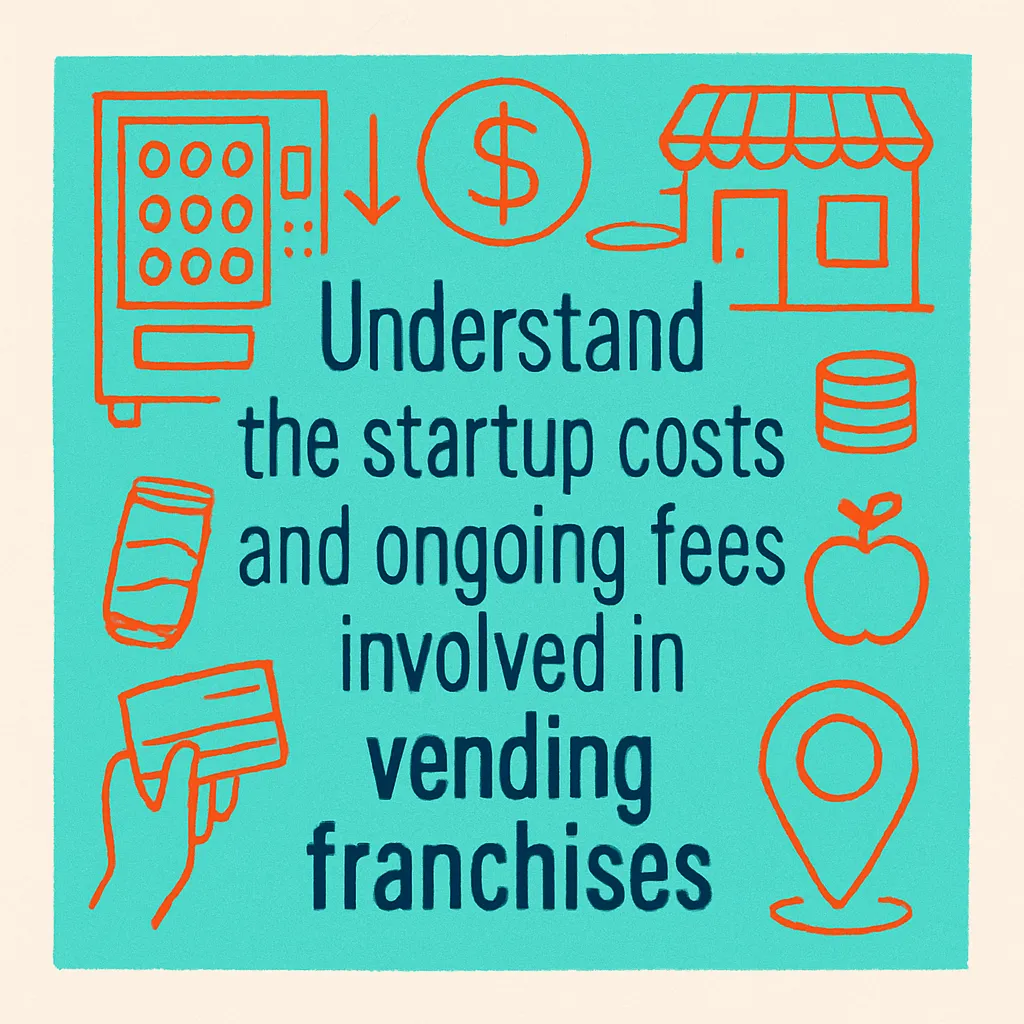Cost of Starting a Vending Franchise
Understand the startup costs and ongoing fees involved in vending franchises.
Back to Vending Franchises ResourcesUnderstand the startup costs and ongoing fees involved in vending franchises.
Back to Vending Franchises ResourcesStart your 30-day free trial and get instant SMS and email alerts whenever a local business needs vending service. These are real location leads to help you grow your route — you decide which ones to buy, no obligations or contracts.
![]() Initial franchise fees grant access to an established brand and support
Initial franchise fees grant access to an established brand and support
![]() Equipment and inventory represent significant upfront outlays
Equipment and inventory represent significant upfront outlays
![]() Ongoing fees cover royalties, marketing, and operational support
Ongoing fees cover royalties, marketing, and operational support
30 days free, then $39 / month.
No Commitment. Cancel Anytime.

Venturing into a vending franchise can be a rewarding path to entrepreneurship, offering the advantage of an established brand and proven business model. However, a clear understanding of the financial commitment involved is paramount for success. The cost of starting a vending franchise isn't a single figure; it's a composite of various fees, investments, and ongoing expenses.
The first significant cost is the initial franchise fee, which typically grants you the right to operate under the franchisor's brand, receive initial training, and access their proprietary systems. This fee can vary widely, from a few thousand dollars to tens of thousands, depending on the franchise's reputation and support structure. Beyond this, you'll need to account for the actual vending machines. Newer, high-tech machines will typically command a higher price than older models, and some franchises may require specific, uniform equipment. Inventory for your initial machines is another upfront expense, as are any necessary permits and licenses to operate legally. Some operators explore vending machine financing options to help manage these significant initial outlays.
Once your vending franchise is up and running, a different set of costs comes into play. Royalty fees, usually a percentage of your gross sales, are paid regularly to the franchisor for continued brand usage and support. There may also be ongoing marketing fees, contributing to a collective advertising fund, or requirements for local marketing initiatives. Operational costs include inventory replenishment, fuel for route servicing, machine maintenance, and potentially rent for a small storage facility. Unexpected repairs or upgrades to payment systems can also arise, making it important to have contingency funds. Understanding these ongoing expenses helps ensure your business remains profitable.
Several factors can significantly impact the total cost of your vending franchise. The number of machines you start with is a primary driver; more machines mean higher equipment and initial inventory costs. The type of machines (e.g., traditional snack and soda, healthy options, coffee, or even advanced AI vending coolers) also plays a role, with specialized units often being more expensive. The geographic location can influence permit costs, local taxes, and even the competitive landscape for securing placements. Additionally, the level of support and training offered by the franchisor often correlates with higher initial fees but can also lead to a more streamlined and successful startup. Prospective franchisees should also research how much money can be made in vending to balance these costs with potential returns.
Vending Exchange connects vending operators with real businesses actively looking for vending services—including traditional machines, AI coolers, and office coffee. Get instant SMS and email alerts when new opportunities are available in your area. No contracts or monthly fees—just buy the leads you want. Start your free 30-day trial today and grow your vending business on your terms.
Initial investments for vending franchises can range widely, often starting from $10,000 to over $100,000, depending on the brand, number of machines, and specific inclusions.
Yes, most vending franchises include ongoing royalty fees, typically a percentage of monthly gross sales, alongside other operational fees.
The franchise fee usually covers the right to use the brand name, initial training, operational manuals, and some initial support services.
Franchise agreements often dictate whether you must purchase new machines directly from approved suppliers, but some may allow for certified used equipment.
Hidden costs can include legal fees, insurance, inventory storage, maintenance, vehicle expenses, and additional marketing contributions not initially highlighted.
Franchisors typically recommend having several months of working capital to cover operational expenses and personal living costs until the business becomes self-sufficient.
Many vending machine financing options are available, including bank loans, SBA loans, equipment financing, or even seller financing from the franchisor.
Yes, many franchises require contributions to a national or regional marketing fund, as well as local marketing expenses for your specific territory.
ROI varies significantly based on location, product selection, operational efficiency, and overall market demand. Thorough research and a solid business plan are crucial.
While some larger operations might, many vending franchises can be managed from a home office with a designated space for inventory storage and machine preparation.